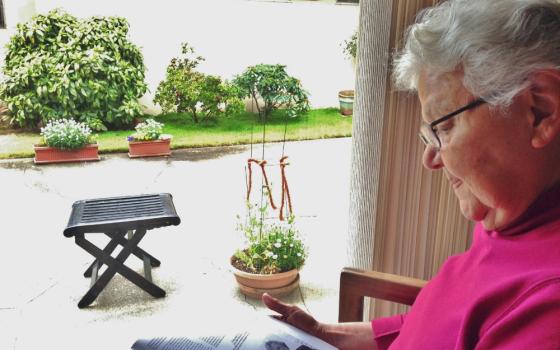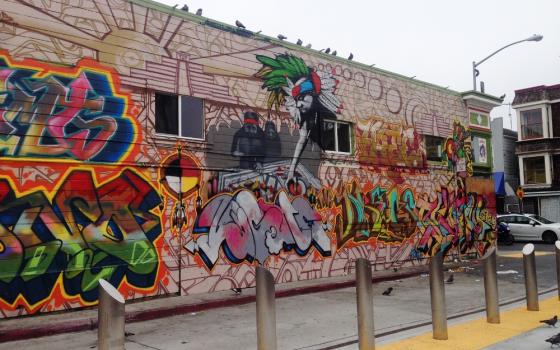Editor's Note: We’re declaring it the first day of summer here and celebrating with the launch of our summer blogging project. Working with the Catholic Volunteer Network, we’ve enlisted four young women working in ministries of Catholic sisters around the world – Honduras, Thailand, Ethiopia and the United States – to blog about their experiences.
First up is Mary Clare Mazzocchi, who is serving for a year at a Cristo Rey high school in San Francisco with Dominican Volunteers USA, a program sponsored by 18 congregations of sisters and friars. Look for her blogs weekly in GSR Today.
______
As a Dominican Volunteer this year, I have had the chance to live in community with 14 Mission San Jose Dominican sisters in their convent in the Mission District of San Francisco. Observing and participating in their prayer, communal lifestyle, and community conversation, I have grown in ways that were unexpected but invaluable.
Lately, I have been thinking especially of the way that contemplative living allows a person and a community to be more adaptable in times of change. The experience of volunteering is one of being uprooted: placed in an unfamiliar city, a new workplace and a radically different lifestyle. Reflecting on my experience this year, I see that the sisters’ example of contemplative living – a trust in God’s presence that makes a person unafraid to face any reality – shaped the way I adjusted to the unfamiliar.
In a recent community meeting, the congregational prioress visited our community to discuss how changes in ministry and community needs might affect the use of space on convent property.
Though the topic could have been difficult – asking sisters to re-envision their home space, something familiar and perhaps dear to them – the sisters responded with excitement. It led to a lively discussion, with sisters volunteering their own ideas for the space and brainstorming new possibilities.
The event impressed me. People tend to resist change: In the United States, we feed a vast cosmetics industry as we try to battle the changing forms of our faces and bodies; we hold fast to our possessions and our personal space. But the sisters were ready immediately to give up what was familiar in order to serve a new need.
Sometimes in our evening prayer, we recite the congregation’s directional statement, which contains the phrase, “We take a long, loving look at what is real.” Contemplative living gives the sisters a powerful combination of attention to reality and openness to transformation. They see problems with clarity and willingly adapt to meet the needs that they see.
I imagine that this openness to change and willingness to adapt must have been crucial in the transitioning of the high school where I serve – Immaculate Conception Academy – from a traditional all-girls Catholic preparatory school into a Cristo Rey school in 2009. The sisters wanted their school to remain within the vision of their foundress, Mother Pia, and their own vision for their ministry. They wanted the school to remain accessible and affordable and serve Mission families, but they saw that the makeup of their city was changing drastically with the burgeoning tech industry.
In a Cristo Rey school – a member of the national Cristo Rey Network – each student works one day a week in a corporate entry-level job, which allows her to both gain exposure to a variety of career opportunities and earn the cost of her tuition. Adopting this model would help the school maintain its mission of service to students and families of limited financial means, but the prospect of making such a drastic change must have been daunting. I suspect that the contemplative leadership of sisters allowed for the perseverance and faith necessary to navigate the transition.
I have tried to adopt this kind of vision and openness into my ministry. As a Cristo Rey school, ICA draws its student population solely from underserved families, and my daily interactions with students have continually challenged me to look at questions of economic justice in a new light.
One of my duties in ministry is to plan and teach weekly lessons on study skills in Academy Plus, the school’s afterschool program for freshmen and sophomores on academic probation. Early in the semester, I planned a seemingly simple exercise on time management, asking the girls to fill in a schedule of their week, writing down honestly how they spent each hour of the day so that they could examine how they used their time, hour by hour.
The topic seemed so standard that I went into the lesson expecting everything to go smoothly, at worst to be a little boring and obvious.
I was shocked that the girls resisted the exercise, not because it was trite, but because they found it upsetting.
They were bringing up issues such as, “I can’t do homework at home because my parents work late, and I have to make dinner and take care of my little sisters,” and, “I don’t know when I get picked up from school, because my mom gets off at a different time every day. I have to wait for her to call, and then she takes me on all her errands so I’m not home alone.”
The room was tense, almost hostile. I wasn’t sure what to do. I coaxed them into finishing the exercise, but the exchange stayed with me for a few days.
It was unexpected, like so many of my encounters with students. I am in unfamiliar territory, and students are constantly surprising me with information about their lives. They bring up stresses and barriers that I would not have thought of, making superficially simple objectives like time management seem fraught and all-but-impossible.
In imitation of the sisters in my community, I took this experience as an invitation to transform. Out of the emotionally tense interaction that I’d had with the girls, I needed to discern the underlying message that I could apply to my future work.
As I have learned alongside the school’s academic counselor, weekly lesson planning requires a delicate balance between maintaining consistency and ensuring that the class meets the immediate needs of students. In this case, I had become aware of new information that changed my idea of what the class needed to be. In addition to exposure to various tools for success, the girls needed something much more practical: more space in the day to complete their homework. We decided to shorten the lessons and add more time for direct tutoring.
The process of contemplative examination and transformation is precisely why the sisters I live with are so effective in their ministries and in community life.
Not only does their contemplative vision make them powerful forces in the lives of those they encounter, but also it ties them inextricably to the place where they are; it makes them natural agents of change in the city of San Francisco.
Take any of the major issues facing San Francisco and the Mission: wealth stratification, neighborhood gentrification, workplace homogeneity, a large and visible homeless population, the drought that we face in San Francisco and the greater state of California. It is no accident that the ministries represented by the sisters in my community respond in some way to each of these issues.
Contemplative living means paying attention. It means letting what you see affect you, changing who you are and what you do. With vision and trust, the sisters in my community will continue to see, to transform, and to serve each other and the changing needs of their city.
[Mary Clare Mazzocchi is a Dominican volunteer at Immaculate Conception Academy, an all-girls Cristo Rey high school in the Mission District of San Francisco.]
Follow Global Sisters Report on Twitter @sistersreport





